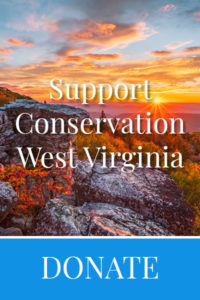Carbon Offset Agreements at Risk
Carbon offset agreements are private contracts between emitters of greenhouse gasses and owners of forested lands. These lands act as a natural carbon sink. West Virginia’s trees remove carbon dioxide from the atmosphere and convert the carbon to wood fiber while releasing oxygen back into the atmosphere. When utilized in long-term wood products such as lumber, that wood fiber stores the carbon from the atmosphere over many years. Carbon dioxide emitters pay landowners not to cut the carbon absorbing timber on their lands. In exchange the producers get carbon credits against pledges to de-carbonize operations or in carbon markets.
More than 12 million acres of forestland stretch across West Virginia, covering 79% of the state. It’s the third-most heavily forested state in the nation, making it prime real estate for carbon offsets. Currently, the participants in these carbon offset agreements are not required to report the existence of the agreements to the state. That didn’t stop Peter Shirley, director of the West Virginia Legislature Division of Regulatory and Fiscal Affairs, from telling the Legislature last year that active forest carbon offset projects covered at least 616,044 acres across 14 counties in the southern and central parts of the state.
Somehow these agreements are such a threat that HB 3294 was proposed last session to discourage them. The concern seems to be two-fold: potential state revenue reduction and the potential abuse of landowners who don’t understand the agreements. The bill would have limited the term of such agreements to 20 years, with the possibility of renewal for another 20 years, and would have imposed an excise tax of 30% on the amount of the payment to the landowner. The carbon emitter would be required to pay the tax.
The bill was opposed by environmental groups, the West Virginia Farm Bureau and property owners’ groups as a threat to a legitimate income stream for farmers and forest property owners, and an obvious incursion into the freedom to direct the use of one’s own land. Perhaps most importantly, carbon offset agreements are a market-based device to reach carbon neutrality and should be encouraged. Conservation West Virginia opposed HB 3294 and, fortunately it died in the Finance committee.
However, just before the session ended a bill to impose a moratorium on contracts limiting timber harvesting was introduced in the Senate. SB 739 only covered contracts related to carbon capture, storage or sequestration. The bill’s sponsor, Eric Tarr (R-Putnam), claimed that there was “an emergency” because these contracts hindered timbering and potentially coal and gas severance. Although passing the Senate unanimously, the House amended the bill slightly and the Senate did not have enough time to concur — and may not have. At present there is no moratorium on carbon offset agreements.
Just exactly how to integrate carbon offset agreements and the state’s Managed Timberland Program will be a topic raised in the next legislative session. In 1946, the Forestry Amendment to the West Virginia Constitution was ratified, which was intended to provide for cooperation by contract between the State and the landowner in the planting, cultivation, protection, and harvesting of forest lands. Forest lands that were included in any such contract could be exempted from the full normal rate of taxation for timber property.
Recently, the Post Audit Division of the Legislative Auditor produced a report on the Managed Timberland Program and identified carbon capture agreements as a potential problem because some of these agreements restrict timbering completely. If the owner of a property participating in the Program also has a carbon capture agreement forbidding timbering, the owner would be in violation of the Program terms. The report estimates that there are 12.2 million acres of forest land in the state, 2.6 million acres of which are under a Managed Timberland Program agreement. Known carbon capture acres total 616,044 — although part of the problem is the state isn’t notified of the existence or terms of carbon capture agreements.
The report suggests that the Legislature could modify the statutory structure to classify carbon capture agreements as “deed restrictions” just as a conservation easement, thereby rendering land subject to a carbon capture agreement ineligible for the Managed Timberland Program. Conservationists and land owners should brace for this approach, which will surely be attempted by legislators hostile to addressing climate change.
Perhaps the way around this issue is to recognize those carbon capture agreements that still permit timbering and reforestation as eligible for the Program. The Post Audit Report itself states that “sustainable forest management practices, such as selective logging and replanting, can maintain
or even increase the carbon sequestration capacity of a forest over the long term. By replanting
trees or allowing for the natural regeneration of the forest, it is possible to offset carbon emissions
while also providing economic benefits to the landowner.”
The Nature Conservancy says that 80 percent of all forest harvesting in West Virginia is via “high grading,” a poor management technique that removes only the best timber from a forest, and therefore degrades carbon stocks, timber quality and wildlife habitat over time. The Conservancy operates several programs designed to help timber owners, both large and small, manage their forest lands profitably while also helping owners participate in carbon markets through offset agreements. Many carbon offset agreements still allow timber harvesting.

